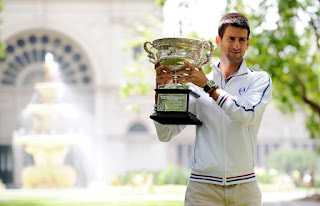WHY WE PLAY: THE CHALLENGE OF COMPETITIVE TENNIS
I recently had a player, “James”, who was going through a rough period. James was struggling in practice and in competition. He didn’t seem to be enjoying himself on-court, becoming over-stressed and making poor decisions while executing strokes and tactics.
It would have been easy to point the blame at his faltering ground-strokes and poor on-court execution, but I felt that spending time working on the details of his game would not have helped. It seemed to me that the problem was mental and not technical.
Sometimes players lose sight of the real reasons they love to play tennis and compete. Often I ask players “Why do you play tennis”? The answers are mostly the same. Players say they “Like to Win” and “It’s fun”. But if that was true we would all play against opponents that we could beat easily. Obviously playing against opponents that can be beaten easily would not be satisfying at all, therefore “winning” is not what brings us back to competition. Sometimes even a loss can be extremely satisfying and rewarding.
If the reason we compete in tennis was for fun, why is it so stressful for most of us during matches? I don’t think I would describe facing a break point as “fun”.
I believe we are attracted to tennis by the challenge. Humans do extraordinary things to challenge themselves. We climb mountains, swim the English Channel, run long distances and continually try to beat previous best times and distances in sporting events. Our passion for challenges have produced amazing feats, and also gotten us killed. We seem to never tire of going beyond our limits.
Therefore I believe we play tennis to be challenged, the tougher the task the better the feeling.
Some players however, lose sight of the reason they play tennis. The challenge becomes the enemy and something to be avoided and blocked out. This leads to a player reacting like James. If things didn’t go well during competition James became angry and sulked. Often after losing a long point he would look skyward for divine intervention.
My talk with James involved explaining to him that he needed to take ownership of what happened on the court. He had been missing shots and failing to execute on-court because he couldn’t accept responsibility for what was happening. He continually blamed outside factors. Every time he lost a point he would think “see, mistakes are beyond my control”.
After our talk James began to take responsibility for his actions, and any time he made mistakes he had to get honest with himself and acknowledge that the fault and the solution were in his hands. He could either continue sulking or take immediate action to remedy the problem. He chose to take ownership and confront the challenges that came alone in his matches.
The transformation was immediate. James began to play as if a heavy weight had been lifted off his shoulders. He began to execute perfectly whatever he decided to do, whether it was a change of direction, decisive offense or staying in the point through gritty defense. If James does make mistakes now, he acknowledges the problem calmly and honestly… and remedies the situation without the previous theatrics!
Players must understand that the reason we play tennis and enjoy it so much is because of the challenges we must face. Giving a player a better insight into the nature of competition could be the catalyst to a much improved mindset and improved results.



%20copy.png)

Comments
Post a Comment